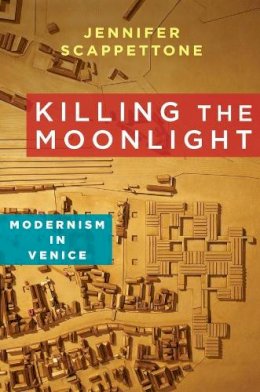22%OFF

Stock image for illustration purposes only - book cover, edition or condition may vary.
Killing the Moonlight: Modernism in Venice
Jennifer Scappettone
€ 65.48
€ 51.27
FREE Delivery in Ireland
Description for Killing the Moonlight: Modernism in Venice
Hardback. Series: Modernist Latitudes. Num Pages: 464 pages, 40 black & white illustrations, 17 colour plates. BIC Classification: 1DST; DSB; JFC. Category: (P) Professional & Vocational. Dimension: 240 x 167 x 34. Weight in Grams: 850.
As a city that seems to float between Europe and Asia, removed by a lagoon from the tempos of terra firma, Venice has long seduced the Western imagination. Since the 1797 fall of the Venetian Republic, fantasies about the sinking city have engendered an elaborate series of romantic cliches, provoking conflicting responses: some modern artists and intellectuals embrace the resistance to modernity manifest in Venice's labyrinthine premodern form and temporality, whereas others aspire to modernize by "killing the moonlight" of Venice, in the Futurists' notorious phrase. Spanning the history of literature, art, and architecture-from John Ruskin, Henry James, and ... Read more
As a city that seems to float between Europe and Asia, removed by a lagoon from the tempos of terra firma, Venice has long seduced the Western imagination. Since the 1797 fall of the Venetian Republic, fantasies about the sinking city have engendered an elaborate series of romantic cliches, provoking conflicting responses: some modern artists and intellectuals embrace the resistance to modernity manifest in Venice's labyrinthine premodern form and temporality, whereas others aspire to modernize by "killing the moonlight" of Venice, in the Futurists' notorious phrase. Spanning the history of literature, art, and architecture-from John Ruskin, Henry James, and ... Read more
Product Details
Format
Hardback
Publication date
2014
Publisher
Columbia University Press
Condition
New
Series
Modernist Latitudes
Number of Pages
464
Place of Publication
New York, United States
ISBN
9780231164320
SKU
V9780231164320
Shipping Time
Usually ships in 7 to 11 working days
Ref
99-1
About Jennifer Scappettone
Jennifer Scappettone is associate professor of English, creative writing, and Romance languages and literatures at the University of Chicago and was the Andrew W. Mellon Postdoctoral Rome Prize Fellow in Modern Italian Studies for 2010-11. She is the translator and editor of Locomotrix: Selected Poetry and Prose of Amelia Rosselli, which was awarded the Academy of American Poets' Raiziss/De Palchi ... Read more
Reviews for Killing the Moonlight: Modernism in Venice
A theoretically sophisticated project, far-reaching in its comparativist approach, and methodologically rigorous throughout. Scappettone's work brings to our attention-and patiently walks us through, so as to let us appreciate-the interrelation of imaginary and lived spaces, literary and cultural history, textual and urban terrains.
Carla Billitteri, University of Maine Troping its object of study, the field of studies of modern(ist) ... Read more
Carla Billitteri, University of Maine Troping its object of study, the field of studies of modern(ist) ... Read more
